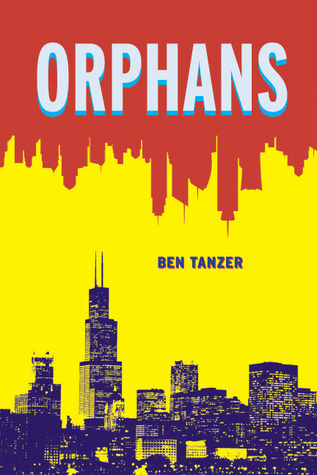Orphans, by Ben Tanzer, is a slick and haunting sci-fi meditation on the full-steam corruption of the American dream and, indeed, America itself. We are shown a bleak future, where more money is devoted to the manufacture and maintenance of drones and droids than to the human poor who are forced to live desperate lives on the fringes of cities. We are shown a world where China has emerged as the dominant nation, the Chinese language is taught in schools, and Chicago has been renamed Baidu. We are shown a city, Baidu, where a complete income gap exists between the jobless masses wandering the streets in vain protest and the powerful elite, ubiquitous, yet invisible, hiding behind a wall of drones and wealth. We are shown a family through the eyes of our conflicted protagonist Norrin Radd.
 An average joe trying to provide for his wife and young son, Radd lucks into a job (won through a lottery) selling virgin Martian real estate to the one-percent-ers. The only catch is that he has to be away from his family for months at a time. Well, not the only catch, but a big one anyway, more on that later. And, in order to maintain domestic stability while these workers leave their homes, The Corporation (which is the creepy, soulless, all-powerful, capitalist entity’s ACTUAL name, irritatingly enough) sends life-like androids call Terraxes into the home, crafted with the physical appearance, memories, and personality of the person they’re replacing. We follow Radd as he struggles with his own identity as a father and provider when so much of that is entirely out of his hands.
An average joe trying to provide for his wife and young son, Radd lucks into a job (won through a lottery) selling virgin Martian real estate to the one-percent-ers. The only catch is that he has to be away from his family for months at a time. Well, not the only catch, but a big one anyway, more on that later. And, in order to maintain domestic stability while these workers leave their homes, The Corporation (which is the creepy, soulless, all-powerful, capitalist entity’s ACTUAL name, irritatingly enough) sends life-like androids call Terraxes into the home, crafted with the physical appearance, memories, and personality of the person they’re replacing. We follow Radd as he struggles with his own identity as a father and provider when so much of that is entirely out of his hands.
Tanzer juxtaposes faded counter-culture totems of punk rock and surfing with the total and permanent dominance of “The Man.” You’re either a member of the elite, you work for them, or you’re desperately homeless, indebted, or both. In Radd, not only do we have a protagonist who moves, miraculously, from indebted to working (Slavery is more like it, but who’s counting?), but we have a hero who truly feels like he’s an aged version of the millennial generation. He is very much an adult in thought and feeling, but his language, dotted with “cool” and “awesome,” feels representative of a linguistic evolution that feels very authentic to me. Norrin Radd’s journey feels very real, as well. As power begets more power and we continue to push people into poverty and worse, what will it mean to provide for a family?
Like the main character himself, the writing is quiet and contemplative with a roiling ocean anxiety and strain just beneath the surface. Tanzer successfully builds suspense throughout the short 167-page book, slowly and with several tense releases. He deftly presents multiple, cliched set-ups which never materialize, only to start building the tension once again, all the while weaving a growing sense of dread throughout the story which only increases with every false climax.
Orphans is a powerful read, thoughtful and penetrating, less ferocious than caustically inquisitive. And, while it takes place in the future, the questions it provokes are for us to answer now. What is the country we are building? Where are we heading, and who is taking us there? Like Orwell filtered through Philip K. Dick, Ben Tanzer’s Orphans is an unflinching, cerebral look in the mirror, and you won’t like what you see.

